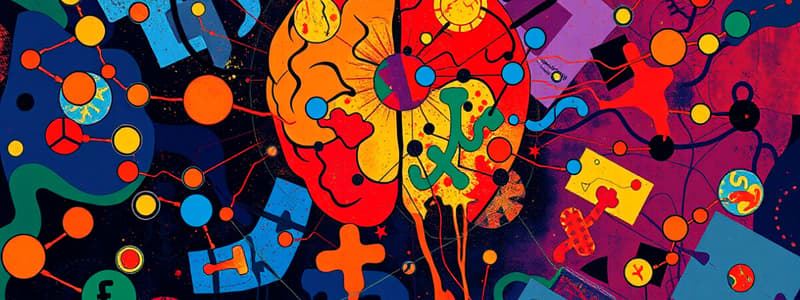Podcast
Questions and Answers
Which class includes medications with the highest potential for abuse but still has medical value?
Which class includes medications with the highest potential for abuse but still has medical value?
- Class 3
- Class 1
- Class 4
- Class 2 (correct)
Which of the following medications is classified under Class 3?
Which of the following medications is classified under Class 3?
- Oxycodone
- Hydrocodone
- Diazepam (correct)
- Street drugs
Why are drug classifications subject to change?
Why are drug classifications subject to change?
- To categorize all medications under a single schedule
- To ensure all medications maintain their medicinal value
- Based on new observational data and usage patterns (correct)
- To make sure all medications are accessible without prescription
What type of medications are categorized as non-scheduled?
What type of medications are categorized as non-scheduled?
Which of the following statements is correct regarding Class 1 drugs?
Which of the following statements is correct regarding Class 1 drugs?
What does psychopharmacology primarily investigate?
What does psychopharmacology primarily investigate?
Which of the following is NOT considered a drug?
Which of the following is NOT considered a drug?
What is the main reason for recreational drug use?
What is the main reason for recreational drug use?
What are the brand names of drugs known for?
What are the brand names of drugs known for?
What does pharmacokinetics study?
What does pharmacokinetics study?
Which aspect of objective effects is true?
Which aspect of objective effects is true?
What purpose does pharmacogenetics serve in pharmacology?
What purpose does pharmacogenetics serve in pharmacology?
What might the prevalence of drug use indicate in psychology?
What might the prevalence of drug use indicate in psychology?
Which medication listed is commonly associated with potential future scheduling due to abuse?
Which medication listed is commonly associated with potential future scheduling due to abuse?
What structure in a neuron helps to conduct electrical signals more quickly down the axon?
What structure in a neuron helps to conduct electrical signals more quickly down the axon?
Which part of the neuron is responsible for receiving information?
Which part of the neuron is responsible for receiving information?
What component of the cell membrane helps to shield the oily layer from water?
What component of the cell membrane helps to shield the oily layer from water?
Which statement describes the lock and key principle in the context of proteins?
Which statement describes the lock and key principle in the context of proteins?
What type of information do sensory nerves primarily carry?
What type of information do sensory nerves primarily carry?
Which of the following terms refers to molecules that do not mix with water?
Which of the following terms refers to molecules that do not mix with water?
What differentiates lipophilic molecules from lipophobic molecules?
What differentiates lipophilic molecules from lipophobic molecules?
What is the primary function of proteins found in cell membranes?
What is the primary function of proteins found in cell membranes?
Which of the following terms indicates a molecule that is both water loving and fat hating?
Which of the following terms indicates a molecule that is both water loving and fat hating?
Study Notes
Psychopharmacology Overview
- Studies the effects of drugs on mood, perception, cognition, and behavior.
- Important for understanding human behavior and therapeutic drug development.
- Examines prevalence of drug use.
Definition of a Drug
- A drug is an administered substance that affects physiological functioning.
- Forms of drugs vary; substances like food and vitamins are not classified as drugs unless administered exogenously.
- Hormones like testosterone are not considered drugs unless introduced externally.
Reasons for Drug Use
- Instrumental use serves specific therapeutic purposes (e.g., coffee for alertness, pain medication for relief).
- Recreational use aims solely to experience the drug's effects, which can lead to dependence (e.g., alcohol for intoxication, LSD for altered perception).
Drug Naming Conventions
- Trade names: Trademarked name assigned by the manufacturing company.
- Generic names: Nonproprietary classifications that distinguish drugs within a category.
- Chemical names: Provide specific chemical identity of the drug.
- Street names: Common alternative names used in informal contexts.
Drug Effects
- Objective effects: Observable effects that can be seen by others.
- Subjective effects: Personal experiences that cannot be externally observed.
Aspects of Pharmacology
- Pharmacodynamics: Studies the physiological actions of drugs.
- Pharmacokinetics: Examines drug distribution, metabolism, and elimination in the body.
- Pharmacogenetics: Investigates how genetic variations affect drug responses.
Drug Classification
-
Scheduled medications: Classified based on potential for addiction.
- Class 1: High addiction potential, no medical uses (e.g., street drugs).
- Class 2: High abuse potential with valid medical applications (e.g., oxycodone).
- Classes 3, 4, 5: Gradually lesser potential for abuse (e.g., sleep medications).
-
Non-scheduled medications: Generally lower abuse potential, includes medications for chronic diseases (e.g., diabetes, heart, and thyroid conditions).
Classification Dynamics
- Drug classifications are not static; the FDA can reclassify drugs based on new data.
- Example: Carisoprodol reclassified from non-scheduled to scheduled in 2012; hydrocodone changed from schedule 3 to schedule 2 in 2014.
Future Classification Considerations
- Current non-scheduled medications may be reconsidered for scheduling due to patterns of abuse (e.g., dextromethorphan, gabapentin).
Basic Neuron Structure
- Neurons consist of a cell body (soma), dendrites, axons, and axon terminals.
- Myelin sheaths enhance signal conduction speed along axons.
Nerve Structure
- Nerves are organized bundles of axons, which can transmit sensory information to the brain or carry motor commands from the brain.
Cell Membranes
- Composed of phospholipid bilayers; fatty lipids clump to minimize contact with water, forming cell walls.
- Membranes contain receptors and channels that are crucial for drug action.
Proteins in Membranes
- Receptors and channels are protein structures made from amino acid chains, critical for drug interaction (based on the lock-and-key principle).
Important Terms
- Hydrophilic: Water-loving.
- Hydrophobic: Water-hating.
- Lipophilic: Fat-loving.
- Lipophobic: Fat-hating.
- Interactions between these properties dictate drug behavior in biological systems.
Studying That Suits You
Use AI to generate personalized quizzes and flashcards to suit your learning preferences.
Related Documents
Description
This quiz explores the critical aspects of psychopharmacology, including the effects of drugs on mood, perception, cognition, and behavior. Understand the importance of this field in relation to drug use prevalence and therapeutic drug development.




